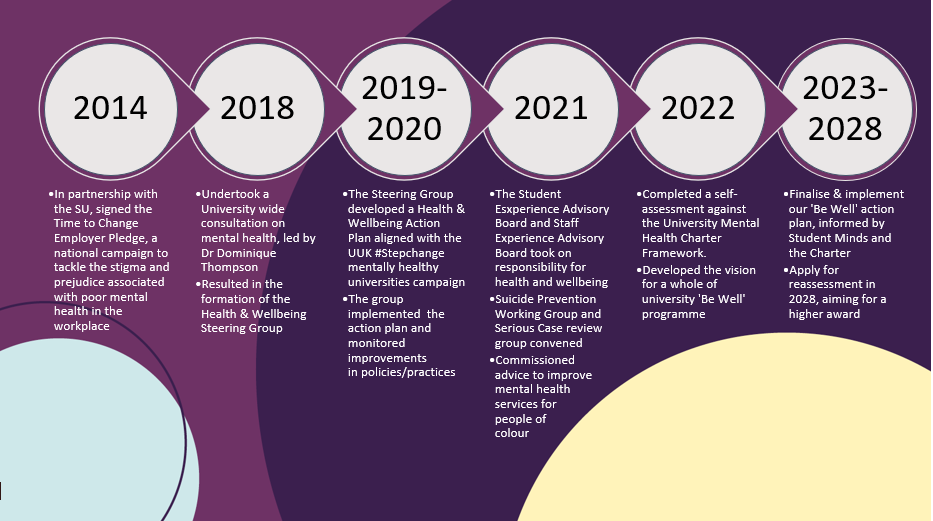In this joint blog, Professor Cassie Wilson, Pro-Vice-Chancellor (Student Experience), and Rajani Naidoo, Vice-President (Community & Inclusion), reflect on the University’s upcoming Mental Health Charter visit and what this means for our community.
We are excited to be joined on campus next week, for two full days, by three external assessors for the next stage of our University Mental Health Charter programme application. They will be speaking to staff and students from across all areas of the University and SU to find out about our approach to mental health and wellbeing, examine our practices and strengths, discuss areas for improvement, and get a better idea of what it is like to be part of our community. This visit is the culmination of a lot of hard work from across our organisation and the SU to apply to the University Mental Health Charter programme, and our thanks go out to everyone involved up to this point and with the upcoming visit.
The self-assessment and application process for the Charter allowed us to look back at the journey the University has been on over the past decade in terms of mental health and wellbeing support. There have been strong developments in both the staff and student spheres. These include the introduction of the 24/7 phone and text service Be Well-Talk Now, the development of preventative interventions like social prescribing, or improved and increased support services for our diverse student cohorts. Our student support services have also developed closer working relationships with NHS and charity partners despite reductions in services, and increased engagement of students in service reviews and development. In the staff area, the appointment of a Staff Health & Wellbeing Manager made a huge difference and has led to the further development of our staff wellbeing services and training programmes, the creation of the Staff Wellbeing Champion Network, and Faculty/Department Wellbeing Action Plans.
We are so proud of all the above and much more. However, the process has also provided us with the opportunity to identify areas for improvement based on best practices from the Charter Framework. Regular feedback from students and staff via the Student Be Well Survey and Work & Wellbeing Surveys has already identified some of the areas to improve. These include developing our information management and data analysis systems to improve decision-making in student and staff services; working more closely with NHS and community services to offer support; ensuring that our physical environment is safe, accessible, and positively supports wellbeing for all; and embedding wellbeing considerations into our curriculum design and pedagogy.

Above: timeline of Mental Health & Wellbeing development at University of Bath.
So, what does this all mean for our community? Supporting our students and staff is an ongoing commitment as emphasised in our University Strategy: ‘The wellbeing of both our students and staff is of fundamental importance.’ While we have made considerable progress already, the journey is not over as we strive to further improve student and staff mental health and wellbeing. Sometimes this can feel challenging considering the ever-changing Higher Education landscape and government priorities. However, the Charter assessment visit, and eventual outcome report, will enable us to take another step forward in our understanding of how to improve mental health and wellbeing, and will contribute to our next wellbeing action plan at Bath.
Finally, we want to thank our whole community – students and staff – who collectively contribute to our wellbeing. Whether you are a Staff Wellbeing Champion, Student volunteer, provide pastoral support as part of your job role, or keep an eye on how your fellow students and colleagues are coping, then you are all making a significant contribution to our culture of care at Bath. Thank you!
To find out more about our whole university vision for mental health, and how to get involved, visit: 'Be Well' at Bath
Respond
